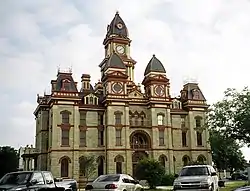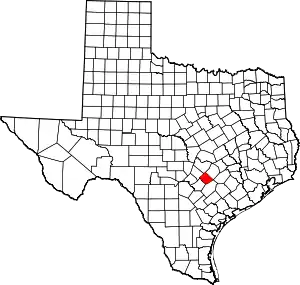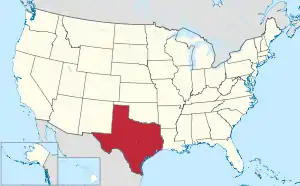Caldwell County, Texas
Caldwell County is a county located in the U.S. state of Texas. As of the 2020 census, its population was 45,883.[1][2] Its county seat is Lockhart.[3] The county was founded in 1848 and named after Mathew Caldwell, a ranger captain who fought in the Battle of Plum Creek against the Comanches and against Santa Anna's armies during the Texas Revolution. Caldwell was also a signer of the Texas Declaration of Independence.
Caldwell County | |
|---|---|
 The Caldwell County Courthouse in Lockhart | |
 Location within the U.S. state of Texas | |
 Texas's location within the U.S. | |
| Coordinates: 29°50′N 97°37′W | |
| Country | |
| State | |
| Founded | 1848 |
| Named for | Mathew Caldwell |
| Seat | Lockhart |
| Largest city | San Marcos |
| Area | |
| • Total | 547 sq mi (1,420 km2) |
| • Land | 545 sq mi (1,410 km2) |
| • Water | 1.9 sq mi (5 km2) 0.3% |
| Population (2020) | |
| • Total | 45,883 |
| • Density | 84/sq mi (32/km2) |
| Time zone | UTC−6 (Central) |
| • Summer (DST) | UTC−5 (CDT) |
| Congressional district | 27th |
| Website | www |
Caldwell County is part of the Greater Austin metropolitan area.
History
Around 8000 BC, Paleo-Indians hunter-gatherers inhabited the area, and later Tonkawa, Karankawa and Comanche peoples became the first identified inhabitants.[4] Caldwell County, of Green DeWitt's petition for a land grant to establish a colony in Texas, was approved by the Mexican government in 1825.
In 1839, Edmund Bellinger became the first settler of Prairie Lea, the county's oldest town. Sam Houston named the town for his future wife Margaret Lea Houston.[5][6] The legislature formed Caldwell County from Bastrop and Gonzales Counties in March 1845. Lockhart was named as the county seat.[4][7]
By 1860, the county population was 2,871, with 1,610 slaves.[4] The community of Fentress was established, originally as Riverside, but later changed to honor the town's first physician, James Fentress.[8] The next year, the county voted 434–188 in favor of secession from the Union. Several hundred men from Caldwell County served in the Confederate States Army.[4]
In the 1870s, St. John Colony was established by former slaves.[9] The town of Luling was established in 1874,[10] close to an earlier farming settlement named Atlanta . John and James Merriwether and Leonidas Hardeman built a gristmill and a sawmill, later known as Zedler's Mills.[11]
The Missouri, Kansas, and Texas completed its track between Lockhart and San Marcos in 1887.[4] Two years later, the San Antonio and Aransas Pass Railway connected Lockhart and Luling to Shiner.[4] By 1892, the Missouri, Kansas and Texas had laid track from Lockhart east to Smithville.[4]
From 1880 to 1900, tenant farming accounted for nearly half of all the county's farming and as much as 75% of the 3,149 farms.[4] The Southwest Texas Sacred Harp Singing Convention was established in 1902 in McMahan.[12]
On August 9, 1922, Edgar B. Davis discovered the Luling Oilfield.[13] The Luling Foundation was established in 1927 by Davis to teach diversity in agriculture and improve the lives of farm and ranch families.[14]
The Lockhart State Park opened to the public in 1948.[15] In 1953, Luling established its annual Watermelon Thump celebration.[16]
Geography
According to the U.S. Census Bureau, the county has a total area of 547 square miles (1,420 km2), of which 1.9 square miles (4.9 km2) (0.3%) is covered by water.[17]
Adjacent counties
- Travis County (north)
- Bastrop County (northeast)
- Fayette County (southeast)
- Gonzales County (south)
- Guadalupe County (southwest)
- Hays County (northwest)
Demographics
| Census | Pop. | Note | %± |
|---|---|---|---|
| 1850 | 1,329 | — | |
| 1860 | 4,481 | 237.2% | |
| 1870 | 6,572 | 46.7% | |
| 1880 | 11,757 | 78.9% | |
| 1890 | 15,769 | 34.1% | |
| 1900 | 21,765 | 38.0% | |
| 1910 | 24,237 | 11.4% | |
| 1920 | 25,160 | 3.8% | |
| 1930 | 31,397 | 24.8% | |
| 1940 | 24,893 | −20.7% | |
| 1950 | 19,350 | −22.3% | |
| 1960 | 17,222 | −11.0% | |
| 1970 | 21,178 | 23.0% | |
| 1980 | 23,637 | 11.6% | |
| 1990 | 26,392 | 11.7% | |
| 2000 | 32,194 | 22.0% | |
| 2010 | 38,066 | 18.2% | |
| 2020 | 45,883 | 20.5% | |
| U.S. Decennial Census[18] 1850–2010[19] 2010[20] 2020[21] | |||
| Race / Ethnicity | Pop 2010[20] | Pop 2020[21] | % 2010 | % 2020 |
|---|---|---|---|---|
| White alone (NH) | 16,841 | 16,560 | 44.24% | 36.09% |
| Black or African American alone (NH) | 2,456 | 2,225 | 6.45% | 4.85% |
| Native American or Alaska Native alone (NH) | 90 | 129 | 0.24% | 0.28% |
| Asian alone (NH) | 344 | 227 | 0.90% | 0.49% |
| Pacific Islander alone (NH) | 8 | 4 | 0.02% | 0.01% |
| Some Other Race alone (NH) | 54 | 178 | 0.14% | 0.39% |
| Mixed Race/Multi-Racial (NH) | 351 | 1,092 | 0.92% | 2.38% |
| Hispanic or Latino (any race) | 17,922 | 25,468 | 47.08% | 55.51% |
| Total | 38,066 | 45,883 | 100.00% | 100.00% |
Note: the US Census treats Hispanic/Latino as an ethnic category. This table excludes Latinos from the racial categories and assigns them to a separate category. Hispanics/Latinos can be of any race.
As of the 2010 United States census, 38,066 people were living in the county. 75.8% were White, 6.8% African American, 0.9% Asian, 0.8% Native American, 13.1% of some other race, and 2.5% of two or more races; 47.1% were Hispanic or Latino (of any race).
As of the census[22] of 2000, 32,194 people, 10,816 households, and 8,079 families were living in the county. The population density was 59 people per square mile (23 people/km2). The 11,901 housing units had an average density of 22 units per square mile (8.5 units/km2). The racial makeup of the county was 70.13% White, 8.50% African American, 0.61% Native American, 0.34% Asian, 17.96% from other races, and 2.74% from two or more races. About 40.4% of the population were Hispanics or Latinos of any race.
Of the 10,816 households, 37.0% had children under 18 living with them, 56.0% were married couples living together, 13.3% had a female householder with no husband present, and 25.3% were not families. About 21.2% of all households were made up of individuals, and 9.4% had someone living alone who was 65 or older. The average household size was 2.82, and the average family size was 3.28.
A Williams Institute analysis of 2010 census data found about 5.8 same-sex couples per 1,000 households lived in the county.[23]
In the county, the age distribution was 28.3% under 18, 8.5% from 18 to 24, 29.8% from 25 to 44, 20.8% from 45 to 64, and 12.5% who were 65 or older. The median age was 34 years. For every 100 females, there were 97.5 males. For every 100 females aged 18 and over, there were 92.7 males.
The median income for a household in the county was $36,573, and for a family was $41,300. Males had a median income of $29,295 versus $21,595 for females. The per capita income for the county was $15,099. About 10.40% of families and 13.10% of the population were below the poverty line, including 15.10% of those under age 18 and 15.40% of those age 65 or over.
Communities
Cities
- Lockhart (county seat)
- Luling (small part in Guadalupe County)
- Martindale
- Mustang Ridge (mostly in Travis County and a small part in Bastrop County)
- Niederwald (mostly in Hays County)
- San Marcos (mostly in Hays County and a small part in Guadalupe and Comal Counties)
- Uhland (mostly in Hays County)
Unincorporated communities
Ghost town
Politics
Caldwell County elected officials
| Position | Name | Party | |
|---|---|---|---|
| County Judge | Hoppy Haden | Republican | |
| Commissioner, Precinct 1 | B. J. Westmoreland | Republican | |
| Commissioner, Precinct 2 | Barbara Shelton | Republican | |
| Commissioner, Precinct 3 | Edward "Ed" Theriot | Republican | |
| Commissioner, Precinct 4 | Joe Roland | Democratic | |
| Year | Republican | Democratic | Third party | |||
|---|---|---|---|---|---|---|
| No. | % | No. | % | No. | % | |
| 2020 | 8,031 | 53.64% | 6,672 | 44.56% | 270 | 1.80% |
| 2016 | 6,691 | 54.94% | 4,795 | 39.37% | 692 | 5.68% |
| 2012 | 6,021 | 54.40% | 4,791 | 43.29% | 256 | 2.31% |
| 2008 | 6,107 | 52.43% | 5,403 | 46.39% | 138 | 1.18% |
| 2004 | 6,436 | 55.55% | 5,052 | 43.60% | 99 | 0.85% |
| 2000 | 5,216 | 55.34% | 3,872 | 41.08% | 337 | 3.58% |
| 1996 | 3,239 | 41.41% | 3,961 | 50.65% | 621 | 7.94% |
| 1992 | 2,749 | 32.95% | 3,794 | 45.47% | 1,801 | 21.58% |
| 1988 | 3,553 | 43.00% | 4,649 | 56.27% | 60 | 0.73% |
| 1984 | 4,315 | 55.81% | 3,401 | 43.99% | 16 | 0.21% |
| 1980 | 2,879 | 46.56% | 3,155 | 51.02% | 150 | 2.43% |
| 1976 | 2,235 | 37.75% | 3,647 | 61.59% | 39 | 0.66% |
| 1972 | 3,171 | 61.45% | 1,974 | 38.26% | 15 | 0.29% |
| 1968 | 1,402 | 27.33% | 2,889 | 56.32% | 839 | 16.35% |
| 1964 | 1,046 | 22.60% | 3,580 | 77.34% | 3 | 0.06% |
| 1960 | 1,482 | 35.10% | 2,729 | 64.64% | 11 | 0.26% |
| 1956 | 1,747 | 40.96% | 2,513 | 58.92% | 5 | 0.12% |
| 1952 | 2,052 | 41.53% | 2,887 | 58.43% | 2 | 0.04% |
| 1948 | 623 | 17.23% | 2,792 | 77.21% | 201 | 5.56% |
| 1944 | 704 | 18.11% | 2,916 | 75.00% | 268 | 6.89% |
| 1940 | 659 | 15.85% | 3,499 | 84.13% | 1 | 0.02% |
| 1936 | 247 | 7.51% | 3,019 | 91.74% | 25 | 0.76% |
| 1932 | 291 | 8.06% | 3,317 | 91.88% | 2 | 0.06% |
| 1928 | 1,189 | 49.54% | 1,211 | 50.46% | 0 | 0.00% |
| 1924 | 399 | 14.27% | 2,194 | 78.44% | 204 | 7.29% |
| 1920 | 269 | 13.01% | 1,240 | 59.99% | 558 | 27.00% |
| 1916 | 225 | 15.43% | 1,216 | 83.40% | 17 | 1.17% |
| 1912 | 56 | 4.64% | 1,068 | 88.48% | 83 | 6.88% |
Education
School districts:[25]
- Gonzales Independent School District
- Hays Consolidated Independent School District
- Lockhart Independent School District
- Luling Independent School District
- Prairie Lea Independent School District
- San Marcos Consolidated Independent School District
- Waelder Independent School District
Austin Community College is the designated community college for the county.[26]
See also
References
- "U.S. Census Bureau QuickFacts: Caldwell County, Texas". United States Census Bureau. Retrieved January 31, 2022.
- "Caldwell County, Texas". United States Census Bureau. Retrieved January 30, 2022.
- "Find a County". National Association of Counties. Archived from the original on May 31, 2011. Retrieved June 7, 2011.
- Smyrl, Vivian Elizabeth (June 12, 2010). "Caldwell County, Texas". Handbook of Texas Online. Texas State Historical Association. Retrieved December 1, 2010.
- Stock, Barbara (June 15, 2010). "Prairie Lea". Handbook of Texas Online. Texas State Historical Association. Retrieved December 1, 2010.
- "Prairie Lea, Texas". Texas Escapes. Texas Escapes – Blueprints For Travel, LLC. Retrieved December 1, 2010.
- "Lockhart, Texas". Texas Escapes. Texas Escapes – Blueprints For Travel, LLC. Retrieved December 1, 2010.
- "Fentress, Texas". Texas Escapes. Texas Escapes – Blueprints For Travel, LLC. Retrieved December 1, 2010.
- "St John Colony, Texas". Texas Escapes. Texas Escapes – Blueprints For Travel, LLC. Retrieved December 1, 2010.
- "Luling, Texas". Texas Escapes. Texas Escapes – Blueprints For Travel, LLC. Retrieved December 1, 2010.
- "Zedler's Mills". Texas Escapes. Texas Escapes – Blueprints For Travel, LLC. Retrieved December 1, 2010.
- "McMahan". Texas Escapes. Texas Escapes – Blueprints For Travel, LLC. Retrieved December 1, 2010.
- Smyrl, Vivian Elizabeth (June 15, 2010). "Luling Oilfield". Handbook of Texas Online. Texas State Historical Association. Retrieved December 1, 2010.
- Parsons, Chuck; Luling Main Street (2009). "Agriculture and the Foundation Farm". Luling (Images of America). Arcadia Publishing. pp. 101–106. ISBN 978-0-7385-7145-4.
- Taylor, Tom; Molloy, Johnny (2003). "Lockhart State Park Trail". 60 Hikes within 60 Miles: San Antonio and Austin. Menasha Ridge Press. p. 88. ISBN 978-0-89732-533-2.
- Pohlen, Jerome (2006). Oddball Texas: A Guide to Some Really Strange Places. Chicago Review Press. p. 160. ISBN 978-1-55652-583-4.
- "2010 Census Gazetteer Files". United States Census Bureau. August 22, 2012. Retrieved April 20, 2015.
- "Decennial Census of Population and Housing by Decade". US Census Bureau.
- "Texas Almanac: Population History of Counties from 1850–2010" (PDF). Texas Almanac. Archived (PDF) from the original on October 9, 2022. Retrieved April 20, 2015.
- "P2 HISPANIC OR LATINO, AND NOT HISPANIC OR LATINO BY RACE - 2010: DEC Redistricting Data (PL 94-171) - Caldwell County, Texas". United States Census Bureau.
- "P2 HISPANIC OR LATINO, AND NOT HISPANIC OR LATINO BY RACE - 2020: DEC Redistricting Data (PL 94-171) - Caldwell County, Texas". United States Census Bureau.
- "U.S. Census website". United States Census Bureau. Retrieved May 14, 2011.
- Leonhardt, David; Quealy, Kevin (June 26, 2015), "Where Same-Sex Couples Live", The New York Times, retrieved July 6, 2015
- Leip, David. "Dave Leip's Atlas of U.S. Presidential Elections". uselectionatlas.org.
- "2020 CENSUS - SCHOOL DISTRICT REFERENCE MAP: Caldwell County, TX" (PDF). U.S. Census Bureau. Archived (PDF) from the original on October 9, 2022. Retrieved June 29, 2022. - List
- Texas Education Code, Sec. 130.166. AUSTIN COMMUNITY COLLEGE DISTRICT SERVICE AREA..